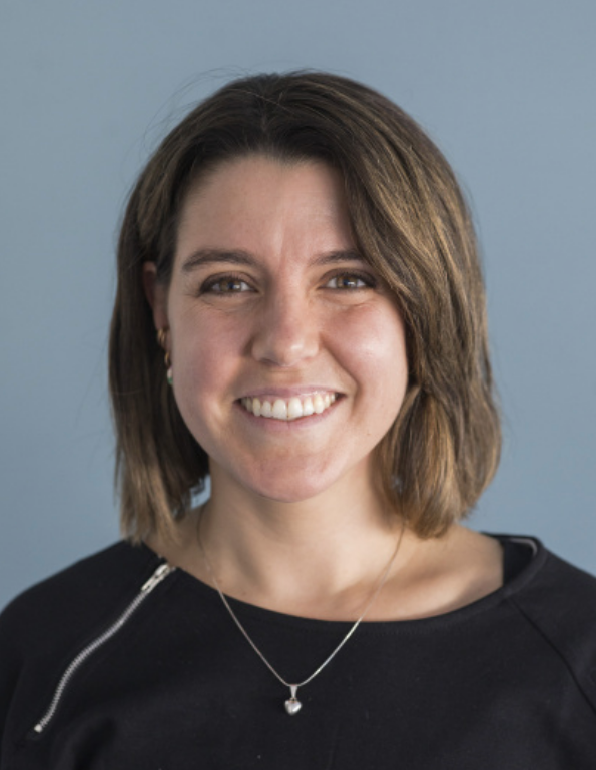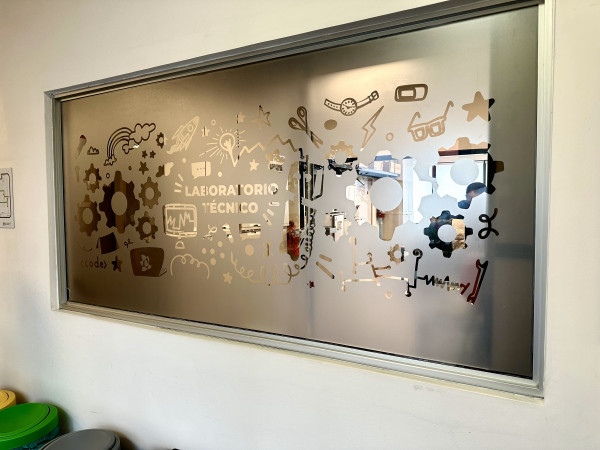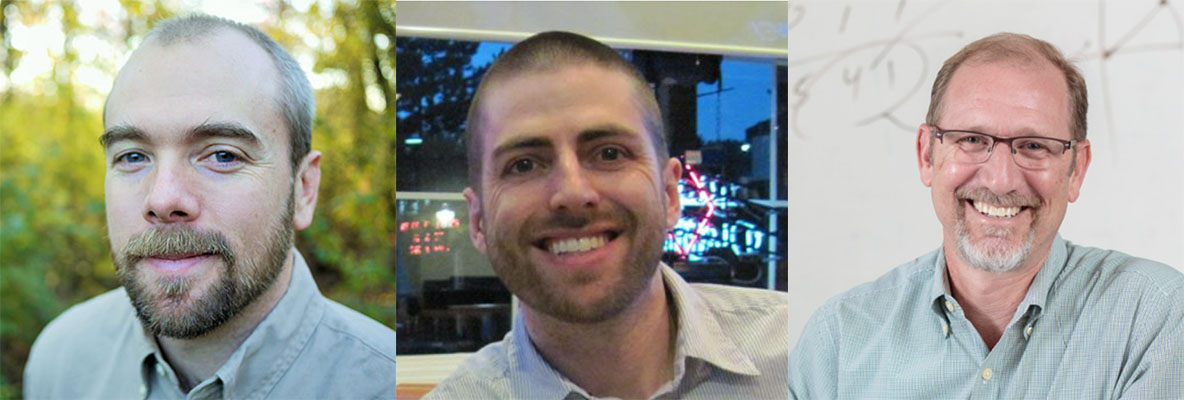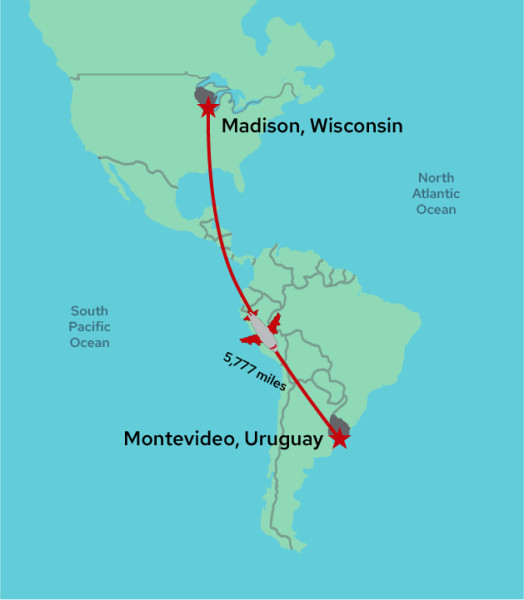WCER researchers work with Uruguay leaders to improve country’s innovative ed-tech center
Center programs include pioneering one-laptop-per-child program
June 6, 2024 | By Karen Rivedal, WCER Communications

Brendan Eagan, left, and Andrew Ruis at Ceibal in Uruguay, where they provided training on richer ways to analyze big data.
Top officials in Uruguay are working with UW–Madison researchers who are expert in pulling rich new patterns of meaning about culture and human behavior from big data to assess and improve the South American country's pioneering educational-technology innovation center, known as Ceibal.
The trailblazing Uruguayan agency was born as the implementer of a nationwide one-laptop-per-child program 17 years ago in a global first. That program now reaches 87 percent of the country's school-aged population, including all students aged 6 to 15 in 100 percent of its public schools.
Recognized as Uruguay's leading digital technology center for public education innovation and policy development, Ceibal provides every teacher and student up to 9th grade with a personal device—a laptop or tablet—along with access to robust digital platforms, professional training, and other resources meant to improve Uruguayan education. Ceibal plans to use the big-data analysis tools and training provided by UW–Madison to review all its operations as an integrated innovation center.

Ceibal's Denise Camou
“We are constantly challenged to incorporate new perspectives and methodologies that help us understand complex and changing realities,” says Denise Camou, head of user experience in Ceibal’s data and behavioral sciences department, which designs a variety of research projects aimed at generating data for evidence-based decision-making.
Ceibal in collaboration with UNICEF invited two researchers from the Wisconsin Center for Education Research, part of UW–Madison’s School of Education, to work with Ceibal in a week of Uruguay-based training in February, followed by continuing joint projects.
“We were identified as bringing humanistic understanding to the use of computational approaches to research,” says Brendan Eagan, associate director for partnerships and community engagement for the Epistemic Analytics (EA) lab in the Center for Research on Complex Thinking (CRCT) at WCER. “We’re really analyzing the way people think.”
See the whole trip in this animated reel with more photos!
A world away
Eagan and Andrew Ruis, associate director of CRCT, made the 26-hour, 5,700-mile trip to Uruguay as the invited trainers and consultants. Sandwiched between Brazil and Argentina and bordering the Atlantic Ocean on the southeastern coast of South America, Uruguay is the second smallest country on the continent. A bit bigger than Wisconsin, it has a population of 3.4 million in a socially progressive, constitutional republic ranked high on global measures of personal rights, tolerance, and democracy.
About one-third of the country’s population lives in Montevideo, the country’s capital and largest city, where Eagan and Ruis provided an intensive week of talks and workshops for more than 100 Ceibal researchers about adopting and adapting EA’s analytic tools around big-data management to benefit education for Uruguayan students. The collaboration between EA and Ceibal continues online, with future trips possible and current development of a project requested by Ceibal President Leandro Folgar on the assessment of technology adoption by teachers with a focus on platform growth.

Outside Ceibal's computer-testing lab in Montevideo, Uruguay.
Ceibal partnered with UNICEF to pay for the travel of Eagan and Ruis, and the pair provided their work for free.
“We feel very lucky to have been invited and to see people valuing our work and be as engaged as they were,” Eagan says, describing the collaboration as mutually beneficial. “Typically, when you do education research, you don’t know if your work will be implemented at scale for maybe years. For us to get to connect with people who are implementing day-to-day and putting our research findings into practice is unique. It’s useful for people who are making decisions about kids in the classrooms today.”
CRCT and the EA lab also benefit from Ceibal researchers using their tools.
“We can continue to advance our model based on things that we’re learning from their real-time practice,” Eagan says.
How the tools work
The EA lab’s specialty is a way of doing research known as quantitative ethnography, which mines new insights by unifying the two traditional methods of data analysis: statistical and qualitative. This approach of bringing statistical rigor to qualitative findings means quantitative ethnography can answer certain questions about complex and collaborative human activity that other methods can’t—for example, simultaneously evaluating the performance of a team and the individuals on that team, while maintaining the context between.
“Our tools let researchers look in more depth at their data,” says David Williamson Shaffer, a UW–Madison School of Education professor and director of the EA lab who developed quantitative ethnography and published a book on the method in 2017. “It’s like we’ve invented a new microscope—a new lens that will let you see things that you couldn’t see before.”

From left, Epistemic Analytics/CRCT's Brendan Eagan, Andrew Ruis, and David Williamson Shaffer
The EA lab, which interacts with users of the methodology around the world, supports more than 250 researchers, with more than 80 ongoing collaborations between the lab at WCER and researchers at more than 50 institutions in 20 countries. One of EA’s free webtools for using quantitative ethnography, known as Epistemic Network Analysis, has over 6,000 users worldwide.
Camou learned about quantitative ethnography through presentations by EA staff at an international conference. The research approach seemed tailor-made for Ceibal’s strengths and limitations.
“Ceibal has an exceptional amount of data, both qualitative and quantitative, but we do not always have the training or the tools to generate such deep analyses on all these available data sources,” she says.
“Quantitative ethnography brings a different and complementary perspective to other approaches we have been working with, since it focuses on a large-scale analysis of discursive patterns, something we did not have until now,” Camou adds. “For example, it allows us to analyze large-scale interactions within and outside our platforms—productive exchanges between teachers, students, and other relevant actors.”
Matching quantitative ethnography’s potential with Ceibal’s strength
Ceibal leaders realized soon after implementing the one-laptop-per-child program that analyzing and improving ed-tech use by teachers and students would require understanding the human culture around it—opening the door for the kinds of insights the EA lab could provide using quantitative ethnography.
“They understood that it’s not just about the technology,” Eagan says. “You can’t just give teachers the tools and expect them to be able to use them. They have to be trained, and then there has to be a culture of practice and a community of practice around these things. And we’re pretty good at that, at that measuring or evaluation of discourse or culture.”

Ceibal headquarters office art

A long flight
Ceibal researchers plan to explore questions using quantitative ethnography about how to improve the existing use of its platforms and programs and how best to use them in new ways to advance education around the country.
Camou believes the most valuable aspect of Ceibal’s collaboration with the EA lab has been in how their different perspectives complement each other.
“The public sector and academia do not always manage to generate synergies or take advantage of all the work potential, and I believe that this collaboration has been very productive in that sense,” she says. “Brendan and Andrew’s vast experience in education research, with a different perspective from the one we are used to in Ceibal, is undoubtedly a great contribution for us.”
Eagan describes working with Ceibal as particularly appealing for the scope of the issues studied and because of the singular leverage and access Ceibal has within both Uruguay and its educational system. It helps to work with a strong partner, he says.
“We are very impressed with not only the organization, but just the working culture,” Eagan says. “I’ve been all over the world and worked with people at top universities, like Tokyo University, the No. 1 university in Japan, and Beijing Normal University, No. 1 in China, and the same within Germany and other places. Even given that context and exposure, I was quite impressed with their organization and the quality of the work that they do.”


